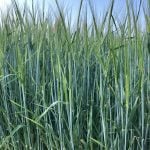DES MOINES, Iowa – It may sound funny to Canadian ears, but the United States pork industry is fighting to expand free trade.
While many Canadians view the U.S. as protectionists, U.S. hog industry officials, Iowa members of congress and the U.S. agriculture secretary lobbied hard during the World Pork Expo here for hog producers to support a new free trade agreement between the United States and a number of Central American countries.
“It ought to be a slam dunk for Iowa. It ought to be a slam dunk for America,” said Iowa congressman Jim Nussle.
Read Also

Strong canola exports expected to tighten supply
Canola exports will end up the third strongest in the past 10 years, according to recent Canadian Grain Commission weekly export data.
He, U.S. ag secretary Mike Johanns and other politicians and hog industry representatives urged producers to support the Central American free trade deal, which is now being considered by the United States Congress.
National Pork Producers Council staff were active throughout the pork expo lobbying hog farmers about the CAFTA-DR deal, which would increase access for U.S. pork to Costa Rica, the Dominican Republic, El Salvador, Guatemala, Honduras and Nicaragua.
They handed out pro-CAFTA-DR buttons and used their hospitality tents as forums to talk about the issue.
The deal, if passed, will allow a gradually escalating amount of certain products, including pork, to be exported to those countries. After 15 years all import controls will be dropped.
NPPC executive member Jon Caspars said American hog producers should support the expansion of free trade because American producers have already benefited from free trade with Canada and Mexico. The gains from those agreements have already been made, so American producers now need more access to other countries.
“Anytime we get access it’s pretty beneficial,” said Caspars.
He said the only way to continue to increase U.S. exports of pork, which have had 14 consecutive years of growth, is to expand market access.
Nick Giordano, a fellow NPPC executive member, agreed.
“When we get a trade agreement, when a new market opens for pork producers, we really benefit,” said Giordano.
Caspars and Giordano were the main representatives for the NPPC’s countervailing and anti-dumping claim against Canada that recently ended in Canada’s favour. Many Canadian producers saw the NPPC’s action as a protectionist act.
Giordano said he didn’t think the recent dispute would undermine the NPPC’s push for free trade with Central America, and had not undermined efforts to preserve market access to Australia.
An Australian judge recently overturned that country’s food safety regulator’s approval of imports of Canadian, U.S. and Danish pork.
“We would be doing a disservice to U.S. hog producers and Canadian hog producers if we allowed the recent trade cases to kind of set the tone for U.S.-Canada hog relations,” said Giordano.
“There are a lot of things that we do agree on that we are working on, and we’re going to continue to do that in spite of the subsidies, which we don’t agree on.”

















